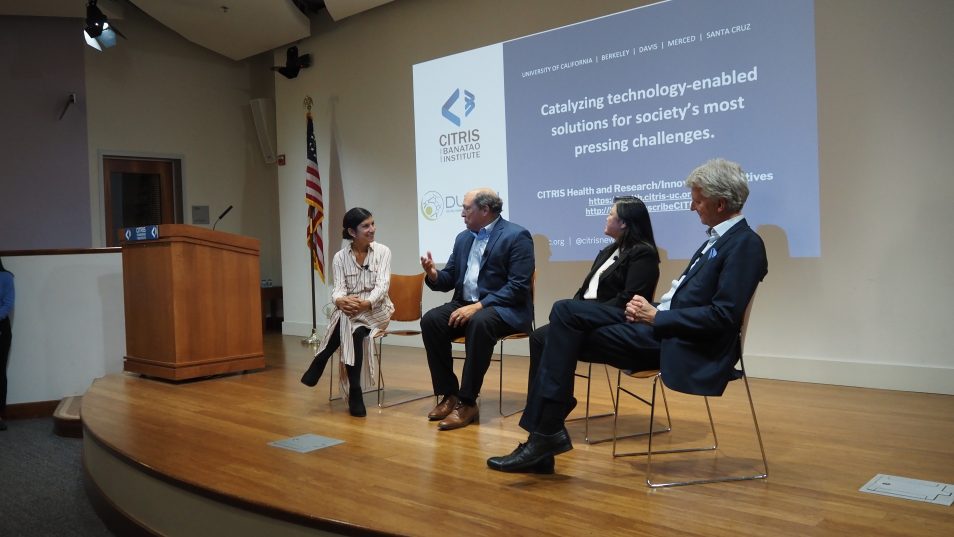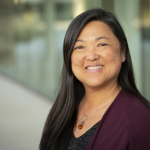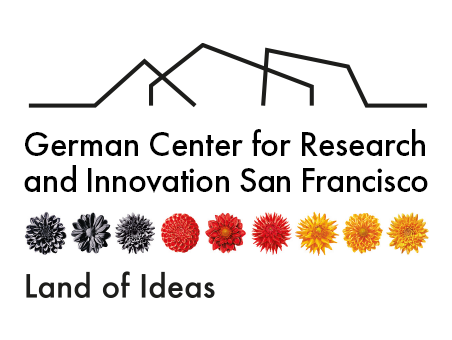The Future of Aging: Transatlantic Perspectives on Digital Health Tech

On May 31st, the German Center for Research and Innovation (DWIH) San Francisco, along with CITRIS and the Banatao Institute held a joint event, titled “The Future of Aging: Transatlantic Perspectives on Digital Health Tech,” which planted the seeds for a new collaboration between CITRIS Health and the Digital Urban Center for Aging and Health (DUCAH) in Germany. Please click here for a one-page summary of the event, for the presenters’ slides, and for the recording.
Here were the key takeaways:
Elderly-focused technology is a burgeoning field that can both improve the quality of life for senior citizens and reduce costs for healthcare systems worldwide. With advances in large language models and artificial intelligence, digital health technologies are being developed with the aim of improving care coordination, allowing older adults to maintain functional independence as they age and enabling them to be seen and treated by physicians where they are most comfortable — at home. Moreover, these technologies have been proposed to support hospital-to-home transition for older adults and the treatment of chronic disease. In particular, the COVID-19 pandemic and the associated physical distancing guidelines have propelled a shift toward digital health technologies and this shift is expected to continue.
 We heard presentations from David Lindeman from CITRIS and the Banatao Institute, Katherine Kim from University of California, Davis and MITRE, and Thomas Schildhauer from Digital Urban Center for Aging & Health (DUCAH) and the Alexander von Humboldt Institute for Internet and Society. CITRIS Health has a presence across University of California campuses and has evolved to focus on digital health projects such as ACTIVATE and Lighthouse. DUCAH is a Berlin-based organization that conducts research in neighborhoods, caregiver organizations, and hospitals to enable digital and social innovations in the health sector. It aims to provide a people-centered approach in age-friendly communities and transfer this research into solutions in the form of business models, publications, and policy.
We heard presentations from David Lindeman from CITRIS and the Banatao Institute, Katherine Kim from University of California, Davis and MITRE, and Thomas Schildhauer from Digital Urban Center for Aging & Health (DUCAH) and the Alexander von Humboldt Institute for Internet and Society. CITRIS Health has a presence across University of California campuses and has evolved to focus on digital health projects such as ACTIVATE and Lighthouse. DUCAH is a Berlin-based organization that conducts research in neighborhoods, caregiver organizations, and hospitals to enable digital and social innovations in the health sector. It aims to provide a people-centered approach in age-friendly communities and transfer this research into solutions in the form of business models, publications, and policy.
 We then learned about one ongoing CITRIS project, ACTIVATE, which is a community-based model for remote patient monitoring. ACTIVATE piloted during the pandemic and has improved chronic illness care coordination, increased the availability of digital tech, and improved access to quality care in under-served communities. Notably, the model implements tele-health solutions to engage the community in a culturally and linguistically appropriate way via community health workers. There were demonstrated outcomes in California among the most disadvantaged populations. For diabetes, there was an improvement of 3.5 points hemoglobin A1c. For hypertension, there was an improvement by 20 points systolic blood pressure and 4 points diastolic.
We then learned about one ongoing CITRIS project, ACTIVATE, which is a community-based model for remote patient monitoring. ACTIVATE piloted during the pandemic and has improved chronic illness care coordination, increased the availability of digital tech, and improved access to quality care in under-served communities. Notably, the model implements tele-health solutions to engage the community in a culturally and linguistically appropriate way via community health workers. There were demonstrated outcomes in California among the most disadvantaged populations. For diabetes, there was an improvement of 3.5 points hemoglobin A1c. For hypertension, there was an improvement by 20 points systolic blood pressure and 4 points diastolic.
Some goals of the event were to plant the seeds for a sustaining partnership and dialogue between California and Germany, pilot the ACTIVATE platform in health centers in Germany, and transfer the ACTIVATE implementation toolkit into a playbook for the German market since both countries have a large aging population. Moreover, CITRIS Health hopes to conduct comparative research in the United States and Germany on digital health platforms. It aims to promote best practices for older adult healthcare needs and to create a transatlantic network of research institutions and public-interest organizations focused on aging-related issues. Concretely, this may take the form of a funded exchange of around 10-20 U.S. and German researchers per year and their projects.
The DWIH San Francisco was delighted to sponsor this event and will continue to be involved in supporting this partnership as it develops. CITRIS Health will be holding a Transatlantic Telehealth Research Network International Scientific Conference on August 22-23, 2023, which will be a follow-up to this event. More information can be found here.
Speakers:

David Lindeman is director of UC Berkeley's CITRIS Health Initiative. He also serves as director of the Center for Technology and Aging, which was developed with support from the SCAN Foundation, and co-director of the Center for Innovation and Technology in Public Health, which advances the use of technology to support population health. He joined CITRIS in 2013. Previously, Dr. Lindeman was the founder and director of the Mather LifeWays Institute on Aging in Evanston, Ill., where he was responsible for developing and implementing evidence-based applied research programs, demonstration projects, education programs and dissemination initiatives. He has held positions as associate professor of health policy at the Rush Institute for Healthy Aging, Rush University Medical Center and as co-director of the University of California, Davis Alzheimer's Disease Center. Dr. Lindeman is a Berkeley Social Welfare alumni. He earned his DSW in 1987 and MSW 1980.David Lindeman

Katherine KimKatherine Kim is an adjunct associate professor in the Division of Health Informatics in the Department of Public Health Services at the School of Medicine at the University of California, Davis, and principal of consumer health informatics and health science at MITRE. Dr. Kim is a health informatics researcher specializing in participatory methods in digital health and clinical research networks. She co-directs the CITRIS Health ACTIVATE project, a major effort to improve care and address social determinants in health in rural and vulnerable communities with digital health and telehealth. She started the International Summer Institute in Telehealth, Informatics, and Data Science, a training program of the Transatlantic Telehealth Research Network and CITRIS active in the United States, Europe and Asia. Dr. Kim has over 20 years of experience as a hospital and medical group manager, the entrepreneur–CEO of a venture-funded startup, the leader of a technology incubator and the founder of a consulting firm. She also worked in software product development with Oracle. She is an elected fellow of the American Medical Informatics Association and received a Ph.D. at UC Davis, an MPH-MBA at UC Berkeley and a B.A. at Harvard.

Prof. Dr. Dr. Thomas Schildhauer is research and founding Director of the Alexander von Humboldt Institute for Internet and Society (HIIG). He is also scientific director of the research group Innovation, Entrepreneurship & Society. Prof. Schildhauer studied computer science at the Technische Universität Berlin (TU) and holds PhDs in the field of software marketing, information management and public health. As computer scientist, marketing expert, internet researcher he works as university professor for electronic business at the University of the Arts (UdK), Berlin. He is founding director and currently chairman of the board of trustees of the Institute of Electronic Business e.V. (IEB), the largest affiliated institute at the UdK. He also heads the Berlin Career College at the UdK, which bundles the further education activities of the UdK. As director of the Alexander von Humboldt Institute for Internet and Society, Prof. Schildhauer conducts research in particular on the topics of “Internet enabled innovation”, “Digital Education” and “Digital Health”. In this context, Prof. Schildhauer also co-founded the Digital Urban Center for Aging & Health (DUCAH).Thomas Schildhauer
